By Madiha Kark
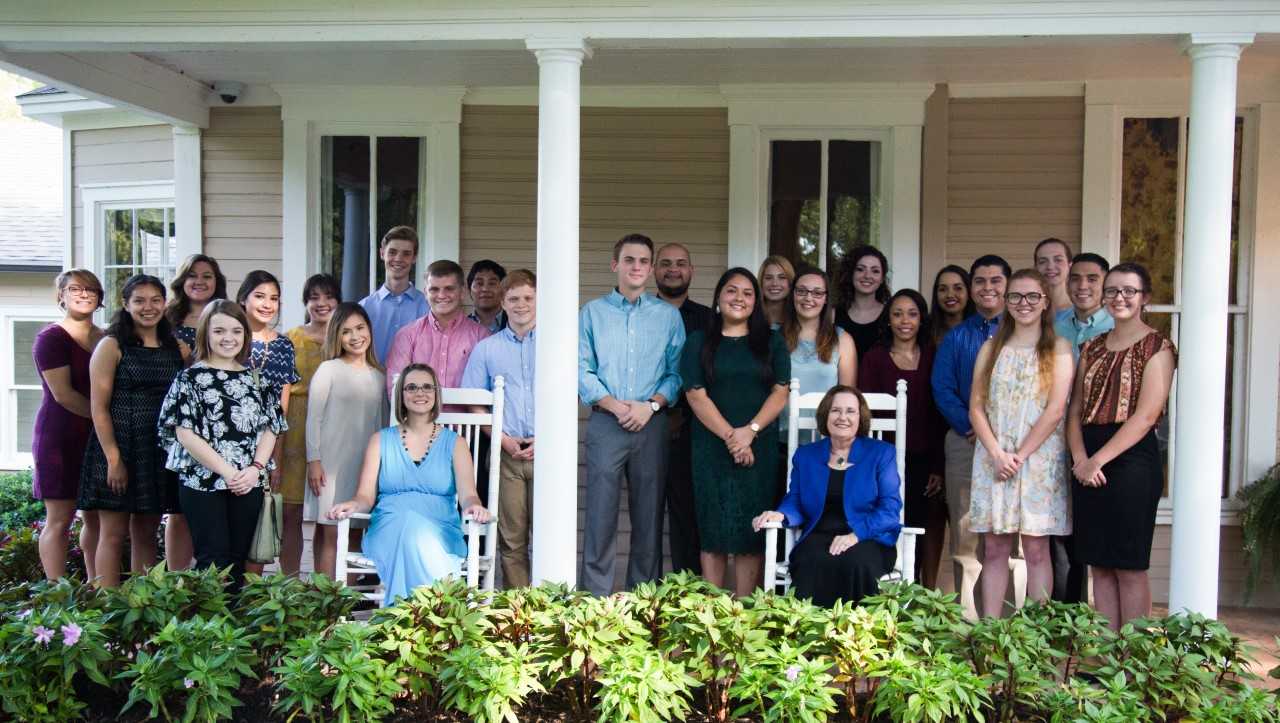 As a college student, staying engaged with coursework and campus life can seem intimidating if not impossible. But for a select group of students at MCC this engagement is a fundamental part of their educational experience, as well as their own core values.
As a college student, staying engaged with coursework and campus life can seem intimidating if not impossible. But for a select group of students at MCC this engagement is a fundamental part of their educational experience, as well as their own core values.
After a competitive application process, a select group of students are named Presidential Scholars each year at McLennan Community College. The students receive a full scholarship and spend the year volunteering around the community, sharing new ideas with campus administrators, and traveling around the country. We sat down with several of these students to learn more about their experience at MCC, and how it has been shaped by this program.
From the start, freshman Ethan Blanton emphasized the power of leadership when recounting his experience as a Presidential Scholar. At just 19 years old Blanton grounds himself daily with the responsibilities his position entails.
“Our number one responsibility is (to) know that we are representing our school. Whether it is at dinner with a speaker… we know the speaker is seeing MCC when he sees us.”
When I asked Blanton to describe his experience with a recent speaker, a grin spread across his face instantly. “Okay,” he said, “my absolute favorite speaker was Supreme Court Justice Clarence Brown. That was one of my favorite experiences in the program but also just in life,” he said sincerely, still maintaining a slight sense of disbelief that this moment had actually occurred. “I never would’ve had the chance to do this, to meet this wonderful man, unless I was in Presidential Scholars.”
Echoing this sentiment, sophomore Scholar Elijah Espinoja spoke of the rarity of these experiences and volunteer efforts. “There are certain experiences we have had here that not many people get,” he said humbly.
This advice has proved beneficial for Espinoja, who radiated a profound sense of both leadership and gratitude throughout the entirety of the interview. “Being involved in this program has opened so many doors for me,” he said while speaking of his own personal and academic experiences at MCC.
One of these doors opened after meeting an engineer at a Presidential Scholars event, when he was inspired to change his major to mechanical engineering. Even with this change Espinoja emphasized the stability he found on campus at MCC. “MCC is a great place,” he said, “everything about this school has been really good to me.”
So good in fact, that Espinoja has now inspired his younger brother to attend MCC and join him in the Presidential Scholars program. He expressed the importance of getting involved on campus, a trait that he seems to have been passed down to his brother Matthew.
“Getting involved anywhere is important,” he advised. “That is how you are going to succeed. You never know who you are going to meet… So do as much as you can, because the experience you get here is one of a kind.”
For freshman Seraphina Gayle, this sentiment of involvement resonated with her own experience throughout her first year at MCC. Gayle visibly lit up when discussing the role of other Presidential Scholars in her life.
“I think it’s important to be involved,” she said, discussing the friendships made through campus involvement. “A lot of times you can put your heads together and figure out what you want to change on campus.”
This people-oriented mentality seemed to be a theme throughout Gayle’s recollection of her time at MCC, but also has roots in the early days of her life. As a first generation college student, Gayle noted the importance of two fundamental people, her mother and father, throughout her educational career.
“For me (college) is something my parents haven’t done,” she said, “so we’re all figuring it out together.” When asked about her parents later she opened up about their impact on her college experience this far. “It definitely makes me more motivated,” she said candidly. “And college truly does have a meaning for me.”
Freshman Presidential Scholar Yuridia Navarro shares a similar story, as a first generation college student centered on motivation stemming from her own lineage. In every possible moment to glorify herself, Navarro managed to highlight the sacrifice and motivation from her parents as the explanation for her continued success.
“My parents came from Mexico for a better education for us and a better future for us,” she said of herself and her two younger siblings. “So them seeing me go to school for free fulfills the purpose of their struggle.”
When asked about the program’s application process, Navarro openly discussed her initial intimidation of the Presidential Scholars program. “I don’t even really remember the application,” she admitted sheepishly. “I just thought ‘this is Presidential; I am not worthy of this.’”
But soon this attitude was changed with the reception of the scholarship, and her concurrent experiences both on campus and around the community. “It makes me humble,” she said. “It makes me feel good giving back to my community because my community has given so much to me through MCC.”
And give back she plans to do, with a bright vision for a career in psychology after graduation. “I think about my family and how none of us have an education, and (how) I want to be that chain that breaks,” she said truthfully. Even with impressive accomplishments behind her and achievable goals ahead, Navarro still shifted the attention away from herself and towards others.
“I want to be a new generation,” she told me. “I want to be the motivation for my younger siblings.”
For each of these students, the sky seems to be the limit for both academic and professional success. But perhaps the most impressive factor linking each of them is the shared responsibility to make a difference; at MCC, around the community and even within their own households. Their deep sense of humility and focus on helping others is as prevalent as it is profound, as these four individuals succeed in inspiring all those around them.
 Madiha Kark is a Marketing, Communications and Photography Specialist at McLennan Community College. She holds an M.A. in Journalism from the University of North Texas. She loves to travel, cook, and read nonfiction books.
Madiha Kark is a Marketing, Communications and Photography Specialist at McLennan Community College. She holds an M.A. in Journalism from the University of North Texas. She loves to travel, cook, and read nonfiction books.
The Act Locally Waco blog publishes posts with a connection to these aspirations for Waco. If you are interested in writing for the Act Locally Waco Blog, please email [email protected] for more information.
By Hannah Byrd
In January of this year, I wandered into my first League of Women Voters meeting. I was pleased with what I found. Wacoans of different generations, political beliefs, and educational backgrounds gathered around a table to discuss how to improve voter participation and education in McLennan County. This is exactly what I had been searching for: an organization that unites citizens in the goal of protecting democracy. I became a student member of the League of Women Voters because I wanted to make positive political change that was non-partisan. In my few months of involvement with the League, I have learned important lessons.
First, more students should get involved with the League. According to The Center for Information and Research on Civic Learning and Engagement (CIRCLE), only 50% of eligible young people (ages 18-29) voted in the 2016 presidential election. This number is discouraging, but there is hope. CIRCLE found that young people who are registered to vote, vote in high numbers. One of the League’s main goals is to register voters to increase voter participation. I volunteered at the League’s registration drive in January. We registered someone who was celebrating his 18th birthday that day. It is exciting to help my peers become active political participants. Young people’s perspectives matter, but only if we express them through our vote. The League knows how important young people are to protecting our democracy. A student membership costs only $5 annually.
Second, I have learned the importance of local elections. At the League’s Candidate Forum in February, I listened to candidates running for local political offices explain their platforms. The candidates who win these offices will make decisions that impact everyone in McLennan County on an individual level. County Commissioners maintain our roads, the District Attorney prosecutes criminal cases, and the County Judge oversees the budget for county government operations. These are just a few examples of local elected officials and their responsibilities. Despite these offices’ important functions, local elections tend to have low voter turnout. A small number of eligible voters shape local policy for everyone. When more people vote in these elections, McLennan County becomes a community that works for everyone.
More voters in McLennan County participated in the recent midterm elections than in the past. To continue these positive changes, the League needs volunteers from a variety of backgrounds. Students can impact the future of their communities and country by becoming a member of the League. We can all help by participating in every election, local, state, and national. Our democracy works best when it reflects the will of the people. This can only happen if we do our part to become educated voters and help our neighbors do the same.
 Hannah Byrd is a senior at Baylor University where she studies International Studies and Arabic and Middle East Studies. In addition to her involvement with the League of Women Voters, Hannah serves as president of Pursue Mentoring Organization, a Baylor service organization that seeks to empower at-risk middle school girls in Waco ISD. She likes watching matinees at the Hippodrome, spends too much time at Moody Library, and enjoys hiking in Cameron Park on sunny days.
Hannah Byrd is a senior at Baylor University where she studies International Studies and Arabic and Middle East Studies. In addition to her involvement with the League of Women Voters, Hannah serves as president of Pursue Mentoring Organization, a Baylor service organization that seeks to empower at-risk middle school girls in Waco ISD. She likes watching matinees at the Hippodrome, spends too much time at Moody Library, and enjoys hiking in Cameron Park on sunny days.
The Act Locally Waco blog publishes posts with a connection to these aspirations for Waco. If you are interested in writing for the Act Locally Waco Blog, please email [email protected] for more information.
By Larry Carpenter
“‘Cause a little bit of summer is what the whole year is all about’.” These lyrics from pop singer John Mayer’s song, “Wildfire,” ignite a spark of anxiousness as the end of the school year inches closer and the summer months draw near—especially for students who have worked hard in the classroom all school year long reading, writing, testing, and growing their minds and bodies.
As a student, I remember so vividly how the looming summer vacation from school would bring opportunities to be outdoors, attend summer camps, go to the swimming pool, or even just mow the lawn and smell the fresh cut grass. The length of the sunny days would unfold and give rise to something new and challenging everyday. And when the Texas heat grew too hot to be outdoors for long periods of time, it was important to have activities indoors to keep me occupied and engaged.
 That is where the Hawthorne Youth Center came into play for me. The HYC was a very small, community-based summer activity center in my old hometown. Owned by a local family, giving back to local kids was priority number one. Just a three-quarter mile bike ride from my front door, the HYC provided creative, athletic, educational, and social activities and events for youth of all ages. It was there that I not only learned the value of being part of a team, but I learned the value of social interaction, developing confidence to start conversations with others I didn’t already know. I enjoyed those summers at the HYC, and I was so very thankful that my school let the group promote their summer camp so that my family had the opportunity to let me go and grow.
That is where the Hawthorne Youth Center came into play for me. The HYC was a very small, community-based summer activity center in my old hometown. Owned by a local family, giving back to local kids was priority number one. Just a three-quarter mile bike ride from my front door, the HYC provided creative, athletic, educational, and social activities and events for youth of all ages. It was there that I not only learned the value of being part of a team, but I learned the value of social interaction, developing confidence to start conversations with others I didn’t already know. I enjoyed those summers at the HYC, and I was so very thankful that my school let the group promote their summer camp so that my family had the opportunity to let me go and grow.
It’s not very different for kids today. As we move closer to the close of the 2018 school year, students and their parents will be looking for activities to occupy their time in creative, fun, and educational ways.
In an effort to highlight many of the amazing opportunities available to families in the Waco area this summer, the Waco ISD Department of Student Services and Family Engagement is sponsoring a Summer Showcase on Saturday, May 5, 2018 at the Mayborn Museum from 9:00 a.m. to Noon.
Organizations, clubs, companies, and non-profits, among others will be sharing information about summer camps, student-centered activities, and other summer happenings at the Showcase. Whether you are looking for artistic outlets, growing a garden, developing leadership opportunities or just finding a way to keep cool in the summer heat—the Summer Showcase is the place to explore all your options. Many of the events and offerings are free or low-cost, and the Summer Showcase is a perfect time to find out what’s going on in our community this summer.
At the Cinco de Mayo themed event, families will enjoy food catered from George’s Restaurant, get free prizes from the various organizations represented, be entertained by a variety of activities and performances, and most importantly, get information on summer activities for youth of all ages.
The event is open to all of the Waco area community. It is never too early to see what’s happening in the community to help you make the most informed plans for the summer.
As the hard work of another school year comes to an end, it reminds me so fondly of my summers at the Hawthorne Youth Center and what a difference those experiences had in my life.
Waco ISD hopes to share some of those exciting opportunities to the community through the Summer Showcase! So, we hope to see you on May 5 at the Mayborn Museum from 9:00 to Noon!
Happy Summer everyone!
 Larry Carpenter is the Director of Fine Arts for Waco ISD. Having been with WISD for 18 of his 24 years in education, he has served WISD as a teacher, assistant principal, principal, assistant director of Advanced Academics and now Director of Fine Arts.
Larry Carpenter is the Director of Fine Arts for Waco ISD. Having been with WISD for 18 of his 24 years in education, he has served WISD as a teacher, assistant principal, principal, assistant director of Advanced Academics and now Director of Fine Arts.
By Anna Dunbar
Have you ever participated in a drug take-back program? If not, what do you do with leftover medicines after you are over that awful head-cold or find some expired pain medicine? I was shocked to learn that some folks think it is a good idea to flush unwanted or expired medicine or put them in their trash. When flushed, medicines can end up in our waterways and can ultimately travel to Texas’ coastal ecosystems. It is possible that all the chemicals in the flushed medicines are now in our waterways. Why is that? Because wastewater treatment plants, where the flushed stuff goes, do not remove chemicals; the plants remove organic waste. So, the treated wastewater, which goes back out to the river may not be as safe and clean as we think. And, the wildlife that live in the water are now swimming in water that contains chemicals.
Obviously, flushing unwanted medications is not a good idea when much safer options are available for no cost.
This Saturday, April 28, residents will have an opportunity to clear their homes of expired or unused medications that drug enforcement officials say may pose a public health threat.
On April 28, 6 collection sites in Waco and surrounding cities will provide safe disposal of pills, tablets and capsules. There will also be two drive-by locations for easy disposal. One drive-by is at Fire Station #1 located at 100 Peach Street in Waco and the second is at Waco-McLennan County Health District at 225 W. Waco Dive. Both drive-by locations will have a peace officer present in the parking area to receive your items. Community members can drop off any controlled or over-the-counter medications anonymously, with no questions asked. Collection sites cannot accept needles and liquids.
What is accepted: Prescriptions/Over-the-counter medications, veterinary medications, vitamins, minerals and drug samples
What is NOT accepted: Oxygen Tanks, Needles or other sharps, Inhalers or thermometers, Nebulizers or IV bags
NEW Waco Drive-by locations (April 28, 10:00 AM – 2:00 PM)
- Fire Station 1, 100 Peach Street
- Waco-McLennan County Public Health District, 225 W Waco Dr.
Waco Drop-off location (Starting Friday morning, April 27 and continuing through Monday morning , April 30)
- WACO POLICE DEPARTMENT, 3115 PINE AVENUE
Other locations (April 28, 10:00 AM – 2:00 PM)
- BELLMEAD POLICE DEPARTMENT, 701 Maxfield Street
- HEWITT POLICE DEPARTMENT , 100 Patriot Court
- LACY LAKEVIEW POLICE DEPARTMENT, 503 E. CRAVEN AVE.
- LORENA POLICE DEPARTMENT, 100 N. BORDON ST.
- WOODWAY PUBLIC SAFETY DEPARTMENT, 920 ESTATES DRIVE
What if you are not available on April 28?
Your best option is to check the extended hours of the Waco Police Department location. If that does not fit in your schedule, hold on to the medicines until the next drug take-back day, which will probably be in the fall of 2018. Another option would be to give your items to a trusted adult for proper disposal at the April 28 event.
Thank you for choosing to do the right thing!
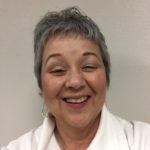 Anna Dunbar is the Operations Administrator for the City of Waco Public Works. She is responsible for informing Waco residents and businesses about recycling and waste reduction opportunities as well as solid waste services in Waco. Her husband is a Baylor professor and her daughter is a graduate student at Baylor University. She is an active member of Keep Waco Beautiful and The Central Texas Audubon Society.
Anna Dunbar is the Operations Administrator for the City of Waco Public Works. She is responsible for informing Waco residents and businesses about recycling and waste reduction opportunities as well as solid waste services in Waco. Her husband is a Baylor professor and her daughter is a graduate student at Baylor University. She is an active member of Keep Waco Beautiful and The Central Texas Audubon Society.
The Act Locally Waco blog publishes posts with a connection to these aspirations for Waco. If you are interested in writing for the Act Locally Waco Blog, please email [email protected] for more information.
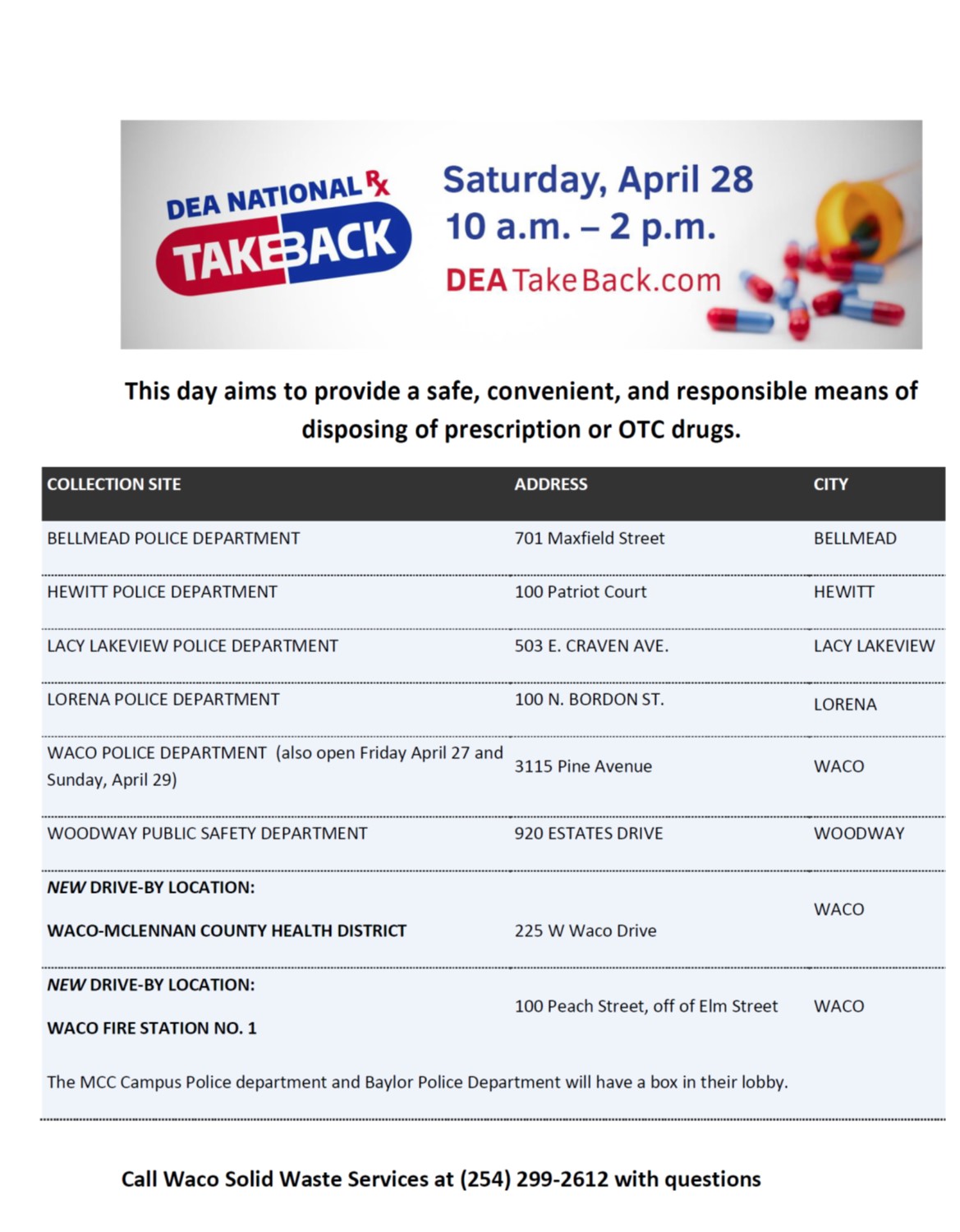
(This post is a part of a regular series “Trails & Trials,” a monthly adventure series inspiring others to experience the physical, mental, and social benefits of cycling, running or swimming in Central Texas. For more posts in this series, click here: Trails and Trials. – ALW)
By Natasha van der Merwe
The question I get asked all the time is “How do you balance it all?”
Many runners, cyclists, and triathletes with families, like myself, spend a great amount of time figuring out how they will fit all their workouts into their busy lives. Sound familiar? Keeping this balance in the home isn’t easy, but you’re not the first to go through this situation and you certainly won’t be the last.
As many of you know, I’m not only a Professional Triathlete that trains 20-25 hours a week, but I’m also a mom, wife, and business woman too. I have responsibilities to fulfill my obligations to my triathlon sponsors. I have duties to assist Bicycle World marketing programs as the Director of Team Programs. That role alone requires managing 15 Bicycle World Ambassadors and hosting several community workout and informational workshops every month. I also have a lively 20 month old toddler, who I try to spend as much time with as possible, not to mention quality time with my spouse, mom, and friends.
So, how do I do it? While I am definitely no expert in this field, I am always looking for ways to do this balancing act better. I have however managed to find some things that seem to work for myself at this present moment.
My first priority is my toddler, and therefore my days do change.
With that being said, I’ve got SIX key strategies to share with you.
CREATE A SCHEDULE WITH FLEXIBILITY
The most important thing I do on a weekly basis, is to create a detailed schedule. I put my training plan, Bicycle World commitments, meetings, family time, shopping, meal prepping, nap time all on a color-coded dry erase board. Note the ‘dry erase’ portion of the board is an important tool as it’s easily adaptable. Things may get shifted an hour here or there, but once it’s on the board, I make sure to get it done one way or another, in a flexible manner.
ASK FOR HELP
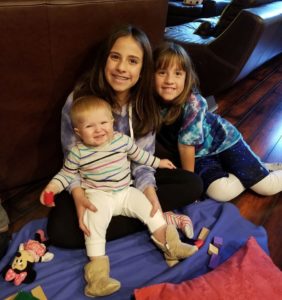 Superwoman is a myth. Ask for help to make this all happen. Anytime I overstretch myself, I pay for it later in an almost complete body shut down. I make sure to stay ahead of the game. Right now, my husband and I are fortunate to have my mother and Nadine’s “nana” staying with us to help out with Nadine. We sit down at the beginning of the week and schedule out the week together on the ‘dry erase’ board. My Mom then knows exactly the times when she is required to take care of Nadine while I am training or away for work. When my Mom was not with us, I was extremely fortunate to have amazing friends who have always expressed their willingness to watch Nadine when I needed them.
Superwoman is a myth. Ask for help to make this all happen. Anytime I overstretch myself, I pay for it later in an almost complete body shut down. I make sure to stay ahead of the game. Right now, my husband and I are fortunate to have my mother and Nadine’s “nana” staying with us to help out with Nadine. We sit down at the beginning of the week and schedule out the week together on the ‘dry erase’ board. My Mom then knows exactly the times when she is required to take care of Nadine while I am training or away for work. When my Mom was not with us, I was extremely fortunate to have amazing friends who have always expressed their willingness to watch Nadine when I needed them.
OVER-COMMUNICATE WITH FAMILY
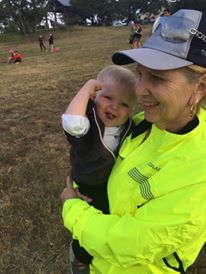 As mentioned before, this is a 100% family effort. I want to make sure they are as comfortable with the schedule as I am. This means that even though we have talked through the schedule at the beginning of the week, I still check in daily with my husband and mom, to make sure the next day’s plans and obligations are still do-able and not overstretching them in any manner. If any of us do happen to have a change in plan, then we can adapt the plan for the next day. An example would be – instead of going on a group run in the morning, I may take Nadine with me to the gym where she gets to enjoy playing with other children in their play area while I hit the treadmill. Gyms like the local YMCA have fantastic child care programs for all ages. Take advantage of them.
As mentioned before, this is a 100% family effort. I want to make sure they are as comfortable with the schedule as I am. This means that even though we have talked through the schedule at the beginning of the week, I still check in daily with my husband and mom, to make sure the next day’s plans and obligations are still do-able and not overstretching them in any manner. If any of us do happen to have a change in plan, then we can adapt the plan for the next day. An example would be – instead of going on a group run in the morning, I may take Nadine with me to the gym where she gets to enjoy playing with other children in their play area while I hit the treadmill. Gyms like the local YMCA have fantastic child care programs for all ages. Take advantage of them.
PRIORITIZE AND SIMPLIFY
The morning before the house is awake is probably my most important time of the day. After my daily bible reading and prayer time, I pull out my journal and right down 3 goals for the day. In my mind, if I can prioritize these 3 items, and hit these goals, I consider it a successful day. Nothing more, nothing less. This keeps me in check from doing too little or too much and keeps me focused on what is most important.
MAKE LISTS
This is my go-to work tool. At the end of each day, I write my to-do list of all the items I need to do. It’s typically a pretty long list. I highlight the most important items that I need to get done the next day. Most of the time, I only get those items done. If I’m feeling particularly energized at the end of the day after I put Nadine down for the night, I may knock out one or two more remaining items. At the end of the day, I will rewrite my to do list minus the items I have accomplished that day.
DON’T MULTITASK – STAY IN THE MOMENT
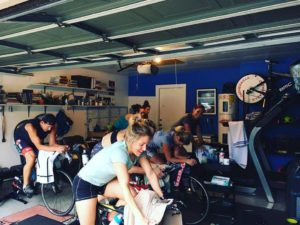 This is most important for me. Having to juggle so many different balls, it is very easy for my mind to get distracted and start thinking about everything else I have to do while working out or just playing with Nadine. So I try to make a commitment to myself to stay in the moment, knowing that whatever I have put aside can be addressed later. I also consider this practice great mental training for my triathlon races. I fully believe that the mind is the strongest muscle in the body and the key to my success. If I can teach myself to stay fully present in life, I can translate that into the race course, which will lead to a better race day performance every time.
This is most important for me. Having to juggle so many different balls, it is very easy for my mind to get distracted and start thinking about everything else I have to do while working out or just playing with Nadine. So I try to make a commitment to myself to stay in the moment, knowing that whatever I have put aside can be addressed later. I also consider this practice great mental training for my triathlon races. I fully believe that the mind is the strongest muscle in the body and the key to my success. If I can teach myself to stay fully present in life, I can translate that into the race course, which will lead to a better race day performance every time.
At the end of the day, including your family in your goals, and allowing them to be a part of helping you achieve them will go a long way toward keeping both family and training as balanced as possible. When you cross that finish line on race day and have achieved your goal, seeing your family there to congratulate you makes it all worth it!
 Natasha van der Merwe is originally from South Africa. She is mom to a 19-month old girl, former professional tennis player and tennis instructor, and a professional triathlete representing Bicycle World and Waco Running Company. She has multiple top 10 finishes in Ironman and 70.3 events around the world. She is Director of Team Programs for Bicycle World, Texas
Natasha van der Merwe is originally from South Africa. She is mom to a 19-month old girl, former professional tennis player and tennis instructor, and a professional triathlete representing Bicycle World and Waco Running Company. She has multiple top 10 finishes in Ironman and 70.3 events around the world. She is Director of Team Programs for Bicycle World, Texas
The Act Locally Waco blog publishes posts with a connection to these aspirations for Waco. If you are interested in writing for the Act Locally Waco Blog, please email [email protected] for more information.
(Tami Nutall Jefferson, a married mother and grandmother, is going back to school and she has invited us all along to enjoy the ride. For more posts in this series, click here: Tami’s Big Do Over. – ALW)
By Tami Nutall Jefferson
As some people are rounding the bases of Prom 2018, some of us are gearing up for Graduation 2018. The sleepless nights studying, the exam crams, the tuition payments, the juggling like we’re professional jugglers – it’s ALL about to come to an abrupt end. We’re now being launched in to the ‘real world’ of full-time employment, student loan payments, and a different kind of work-family juggling. For some of us, this road trip has taken almost half a century. Sadly, this season is not mine – but joyfully, it belongs to my guest, Terronga Weaver.
Terronga Makes Her-story
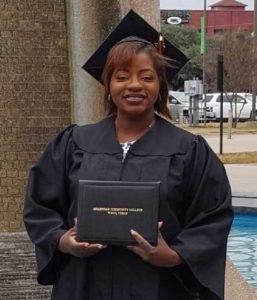 Terronga Weaver is repping Tarleton State University’s graduating class of 2018 with her Bachelor’s degree in Human Resources. Terronga is a Waco native, mother of 4, heir to the Jockey Club 100-year legacy – and, 45 years young. As Terronga readies to graduate on May 12th, I had the opportunity to hear her story about her life and her future. I’ll let you guys in on a little bit of it here.
Terronga Weaver is repping Tarleton State University’s graduating class of 2018 with her Bachelor’s degree in Human Resources. Terronga is a Waco native, mother of 4, heir to the Jockey Club 100-year legacy – and, 45 years young. As Terronga readies to graduate on May 12th, I had the opportunity to hear her story about her life and her future. I’ll let you guys in on a little bit of it here.
TNJ > The floor is yours. What do you want to say to the people right now?
TW > It’s like Murphy’s law, the closer I get to finishing, the harder it gets. Different things pop up, and everything that can go wrong, will try to. There will always be challenges. People will always tell you to quit, BUT just know that you will be DYNAMIC when all this is finished.
TNJ > What was the beginning for Terronga?
TW > This journey started 22 years ago. I had just moved into Estella Maxey projects with 2 kids. Now, I have 4 kids, and 1 grandbaby. I was unemployed but starting college at MCC as part of the self-sufficiency program. I had to remind myself that low-income does not mean low-class. I eventually started working too. And not really knowing what I was doing to myself, I quit MCC with just 1 semester left to graduate and went on to work two [simultaneous] jobs in the nursing and fast-food industries for the next 10 years.
TNJ > Can you give us a little insight into life as a mom during this time?
TW > It was hard as a mom because of the judgment. You’re a bad mom if you work all the time. You’re a “welfare mom” if you’re at home taking care of your kids all day. Meanwhile, dads get no judgement for not being there. I had a hard time finding the balance or confidence in this particular situation.
TNJ > What was your lightbulb moment?
TW > I was working 2 jobs – typically from 8am to 11pm. One day I was late for one of my 6am shifts…and got wrote up! I realized at that moment, that for 10 years, I had been so busy making somebody else’s brand better, but I had lost my own brand at home with kids. My 2 younger kids (14 & 18) know me as the ‘soccer mom’, but my 2 older kids (26 & 27) just know me being at work. I lost their childhood and knowing who they are. I made up my mind that if I have to lose everything to start over, I will.
TNJ > Oooh, what happened next?
TW > I went to talk with MCC and Tarleton to see about finishing my education. That was in 2015 or 2016. Amazingly, they took every credit I had [earned], and I cried. I worked hard and had awesome people to help me out along the way. In December of 2017, I graduated from MCC with my Associate’s in Applied Science, and in a few weeks [from now], from Tarleton with my Bachelor’s in Human Resources. I took 5 classes last semester and 5 this semester, while still working at Home Depot, taking the weekly WIBO class with you at City Center Waco, and helping my mom run the Jockey Club in East Waco…and still being a mom.
TNJ > What pushed you through?
TW > You have to know your why. I, literally, look in the mirror and tell myself “I’m worth it.” Today’s sacrifices will pay off. You have to be your own biggest cheerleader. Take it slow if you have to. Just know that school will always work for you. Someone will always help you. There are thousands of reasons why you shouldn’t, but you only need one reason why you should. Mine was because I’m worth it.
TNJ > Tell me how this feels – graduating – because I can’t imagine right now.
TW > An interviewer told me I have options now. I don’t have to settle. Again, I cried. NOW, I am educated, well-informed, and I know my worth. I can have you design me the house I really want. I don’t have to live in the projects. There’s so much out there for me now. It’s bigger than surreal. I finally broke through my glass ceiling. Now I have to create another one to break through.
TNJ > Now you’re ready to move forward. What does your dream look like in the future?
TW > I’m a community person. The thing that hurts me most is to see our veterans come home with PTSD or be homeless and suffer. My dream would be to create a nice place for them. My bed and breakfast where they can return from tour and decompress and get reintegrated into American culture. My mom was a military nurse, so she can care for them, and I can provide them a safe, low-key place where they can calm their minds and bodies before going back to their “normal” lives and families here.
There’s so much more to Terronga, with her passion for human resources, loving on and engaging with people, managing businesses, I can’t fit it all here. If you want to know more about her, employ her, or help her make the dream possible for local veterans, email her at [email protected]
 Tami Nutall Jefferson is an older, non-traditional student with a professional real estate background. Tami begins her first academic year at Texas A&M University pursuing a Bachelor’s Degree in Urban Planning and Land Development while commuting between Waco and College Station. Her hope that every Wacoan – from all corners – can engage in and contribute to the growth and success of the city. You can connect with Tami at [email protected] or on Facebook at https://www.facebook.com/tami.nutall1.
Tami Nutall Jefferson is an older, non-traditional student with a professional real estate background. Tami begins her first academic year at Texas A&M University pursuing a Bachelor’s Degree in Urban Planning and Land Development while commuting between Waco and College Station. Her hope that every Wacoan – from all corners – can engage in and contribute to the growth and success of the city. You can connect with Tami at [email protected] or on Facebook at https://www.facebook.com/tami.nutall1.
The Act Locally Waco blog publishes posts with a connection to these aspirations for Waco. If you are interested in writing for the Act Locally Waco Blog, please email [email protected] for more information.
Read Locally Waco is a project to promote literacy in Waco. Throughout the semester we will post stories that use sight words our children are learning in Waco ISD. You can print these stories and lists of words to use with your children or with other children in your life. This week’s story uses words from the First Grade Sight Word List. For a printable version of this story and word list, click here: How Living at the Zoo Leads to Trouble .
How Living at the Zoo Leads to Trouble
The teacher frowned and asked me why I do the things I do.
I told her all the trouble starts with living at the zoo.
A monkey and a panda bear, a piglet and a snake …
All moved into the room next door. They’re keeping me awake!
The monkey plays the guitar. The panda bangs on cans.
The piglet kicks the wall all night. The snake beats pots and pans.
They call it making music. They practice every day.
They think they sound fantastic. (To me they’re just OK.)
So, I didn’t get to sleep last night till way, way after dark.
All the animals were snoring. I could hear them through the park.
I got up very early to pick out my clothes to wear,
But, the tiger swiped my shoes and socks and took them to her lair.
She would not give them back to me. She made me beg and beg.
And while I was distracted, the rhino ate my eggs!
The Lion woke up hungry, licked his lips and grinned at us.
So, I had to feed the lion, even if I missed the bus.
The zebra stole my mom’s new car. The cheetah took my bike.
The hippo flattened granny’s truck, it was a sad, sad sight…
Because of this I had to walk at least a million miles.
And when I finally got to school, I wasn’t full of smiles.
I’m tired and mad and hungry. I hardly slept a wink!
It’s true I pulled Chameka’s hair. She deserved it, don’t you think?
First Grade Sight Words in this Story
- All
- Back
- This
- With
- Night
- Why
- Was
- Don’t
- Give
- Of
- Were
- Because
- Every
- New
- Walk
- Her
- Had
- Day
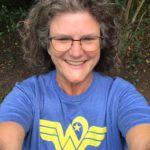 This Act Locally Waco blog post is by Ashley Bean Thornton, she has lived in Waco almost 20 years now. Far longer than she ever lived anywhere else. She likes to walk. If you see her out walking, honk and wave and say “hi!”
This Act Locally Waco blog post is by Ashley Bean Thornton, she has lived in Waco almost 20 years now. Far longer than she ever lived anywhere else. She likes to walk. If you see her out walking, honk and wave and say “hi!”
The Act Locally Waco blog publishes posts with a connection to these aspirations for Waco. If you are interested in writing for the Act Locally Waco Blog, please email [email protected] for more information.
by Bill Gaventa
This month is Autism Awareness Month. The Heart of Texas Autism Network sponsors a number of wonderful activities in pursuit of recognizing children and adults on the autism spectrum as full members of our communities. Last month was Developmental Disabilities Month and well as national Traumatic Brain Injury Month. March also included an international Down Syndrome Day (March 21).The last week of September is an International Deaf Awareness Week. October is both national Disability Employment Month, and National Mental Illness month, followed by November as national Alzheimer’s Awareness month, a month started by a proclamation from Ronald Reagan. There are multiple others. One could go on and on.
What’s more, each of those awareness months and days compete with other kinds of awareness campaign that have nothing to do with disabilities. You name it. There is probably a day for it. I remember a commentary about all of this on NPR a long time ago, with the speaker yearning for the possibilities of a “National Nothing Day,” one that would probably be appreciated by many as long as they did not have to sign declarations about it, lead public relations campaigns, or do the multiple other things that one has to do in order to help one of these days or months become something more than “in name only.”
Of course, all of these groups know that awareness is something they yearn for all year round. There are daily needs that go unseen and unmet, assumptions and stereotypes that go unchallenged, and both people and caregivers who go forgotten and unsupported.
Many also know there is a double edge to special awareness days, weeks, or months. Calling anything “special” can unwittingly imply that that people are more different than alike, that special skills are needed to be human and hospitable with another, and that specialized programs are more important than friendship and being part of neighborhoods, congregations, clubs, and community activities of all kinds. Hopefully, one day, “special” becomes unnecessary, because everyone is treated as unique and valued, receivers and givers, citizens and potential friends. Everybody, as Nigerian novelist Chimamanda Adichie
says in a famous TED talk, is more than a single story. In fact, she says it more forcefully: There is danger in being seen as having a single story.
But we are not there yet. People with disabilities, their families and friends, and organizations that support them all need supporters and allies as the work of weaving people into community life goes on, and they are known as people with multiple interests, gifts, and stories.
If you stopped for a moment to ask, “Do any of these groups work together, the answer is “Yes.” Waco is lucky enough to have several organizations that seek to link these individuals, families, organizations and services together. One of them is the Waco Mayor’s Committee for Disabilities.
It’s a mouthful of a name. It sounds formal and official, but truth be told, it is neither. It is one of those organizations that only exists because of the voluntary commitment and work of the people and organizations who choose to be involved. No one’s paid. We get by financially with the help of our friends, organizations and businesses who help donate to, and sponsor, two major events each year for people with disabilities, their families and friends: The Starry Night Holiday Celebration during the Christmas season, and Join the Pride, the upcoming free day at Cameron Park Zoo (April 22) that also serves as an information and resource fair for people with disabilities, their families, and friends.
What else do we do? We have been thinking about that, and have a vision of serving as a collaborative, active network that can (1) respond as a team to people and families searching for services and supports, (2) share information with one another on new and exciting ideas and supports, and (3) work together across disability labels and organizations to support one another and to meet needs we cannot by ourselves.
Many cities established Mayor’s Committees several decades ago. Many of those have withered on the vine. Some key people in McLennan County, including Darlene Nobles of Signs of the Times, Anita Karney of the Heart of Texas Autism Network, and Kelly Yarbrough, formerly of DARS but now of the Texas Workforce Coalition, have helped keep the Waco Committee alive. Now there are new voices wanting to strengthen current projects and do things together that we cannot do separately. The key phrase these days in human services, as in other arenas, is taken straight from the farm: Get out of our silos and talk to one another.
Anyone’s welcome to join in as a member (no dues), participant, advocate, and worker. If you come with curiosity, we can hopefully answer questions. You don’t need to fill out forms. If you come with ideas and dreams, be prepared to work on them. We may not yet have all the supports and services people need, but through this Committee and network, you’ll have allies, people willing to listen, and others willing to celebrate the wide diversity of ways that people and groups in Waco are working to give everyone the chance to participate in the community as they wish. As Waco begins to grow and thrive, let’s help the lives of those with one form of disability or another flourish as well, and become known more for their grit, gifts, and desire to contribute to this community as well.
How to get started? Email [email protected], and Like the Waco Mayor’s Committee for Disabilities on Facebook. Put out a question there. And share information. Find out about next meetings. (usually once a month) Come to Join the Pride on Sunday, April 22, and meet a bunch of the people involved. Join the Pride started because the lion’s pride at Cameron Park Zoo once had a lion who was shunned by the others because of a disability. So the founders wanted to be part of her pride, at least symbolically. Now, we have a zoo that is known for its skills in rehabilitation of animals, and multiple support organizations seeking to help individuals and families feel pride in their own lives and community. We need dreamers and workers. Everyone has gifts. It is our job together to find ways to use them.
Here’s the information about Join the Pride… be sure to register online so we have an idea who is coming. To request free tickets for families with special needs children, adults with disabilities, or veterans with disabilities and a guest, visit: http://www.tinyurl.com/2018JTPZooTickets or email [email protected]
To sponsor a family or for a free booth register at: http://www.tinyurl.com/2018JTPBoothSponsor.
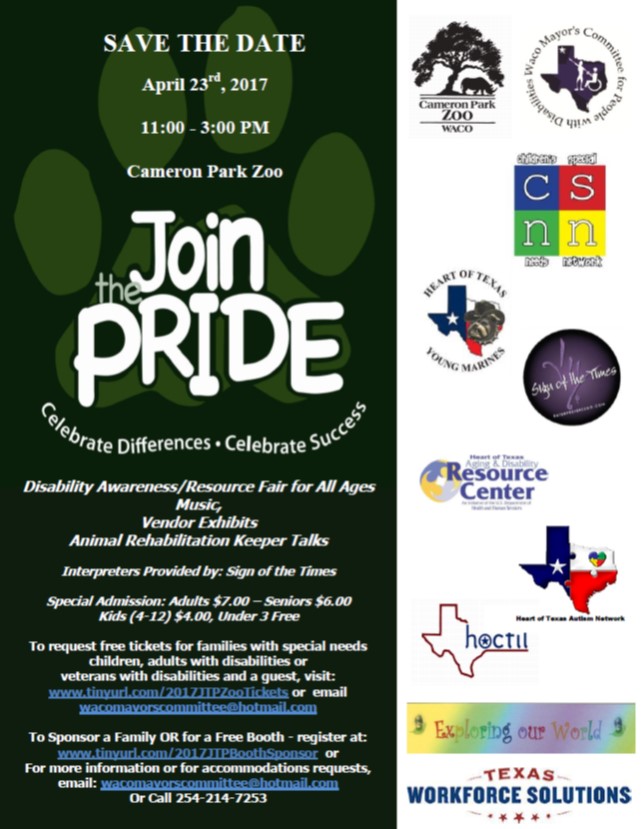
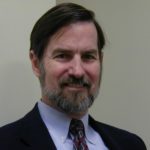 Bill Gaventa is the Current Co-Chair, Waco Mayor’s Committee for Disabilities. He is an ordained Baptist minister currently serving as the Director of the Summer Institute on Theology and Disability and the national Collaborative on Faith and Disability. Bill’s pastoral career has been in a variety of roles at the intersections of faith and disability, including community supports with people with disabilities, training for clergy, seminarians and community services staff, aging and end of life/grief issues in intellectual and developmental disabilities, cultural competence, and community building. He served as the President of American Association of Intellectual and Developmental Disabilities for 2016-2017. He and his wife Beverly moved to Waco in 2013 where she serves as Professor of New Testament Interpretation at Baylor University. In Waco, Bill serves on the Mayor’s Committee on Disabilities, the Board of the Arc of McLennan County, and the Professional Network Advisory Committee of the Heart of Texas Region MH/MR Center. You can email Bill at [email protected].
Bill Gaventa is the Current Co-Chair, Waco Mayor’s Committee for Disabilities. He is an ordained Baptist minister currently serving as the Director of the Summer Institute on Theology and Disability and the national Collaborative on Faith and Disability. Bill’s pastoral career has been in a variety of roles at the intersections of faith and disability, including community supports with people with disabilities, training for clergy, seminarians and community services staff, aging and end of life/grief issues in intellectual and developmental disabilities, cultural competence, and community building. He served as the President of American Association of Intellectual and Developmental Disabilities for 2016-2017. He and his wife Beverly moved to Waco in 2013 where she serves as Professor of New Testament Interpretation at Baylor University. In Waco, Bill serves on the Mayor’s Committee on Disabilities, the Board of the Arc of McLennan County, and the Professional Network Advisory Committee of the Heart of Texas Region MH/MR Center. You can email Bill at [email protected].
The Act Locally Waco blog publishes posts with a connection to these aspirations for Waco. If you are interested in writing for the Act Locally Waco Blog, please email [email protected] for more information.
By Andrew Patterson, Kristopher Ruiz & Caroline Capili
400 hundred years ago, immigrants from all over the world boarded ships to escape persecution, to start a new life. A life free from fear, a life with endless possibilities, a life with hope for a better future. Today, that same thing is happening with children ranging from a few years old to teenagers. Only these children are not boarding boats or sometimes not even traveling with their family. These children are jumping on moving trains, trekking across deserts, crossing streams all the while trying to evade those seeking to exploit them. These children are fleeing domestic abuse, violence, poverty, and food insecurity in hopes that they may have a better life and help out their families.
Our project began last fall when we, Caroline Capili, Kristopher Ruiz, and Andrew Patterson signed up for a brand-new class at Baylor University led by Dr. Victor Hinojosa and Dr. Lori Baker focusing on the issue of child migration in the Western Hemisphere with an emphasis on the Northern Triangle countries. We attended weekly lectures, read reports and books, and met with numerous experts in the field. We were asked to develop an innovative project to address the child migrant crisis. We spent many classes going through the process of design thinking to come up with ideas about what we wanted to accomplish and how we were going to do so. After months of going through this process, we agreed that we wanted to bring attention and awareness to this crisis and start a dialogue here in Waco. Once we had this purpose, we thought the best way to approach a problem with multiple facets was through art. We looked up different examples of art exhibits focusing on the issue of immigration, and that’s when we first came across Northern Triangle.
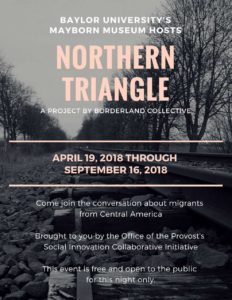 Northern Triangle is an exhibition created by Borderland Collective that opens a space for constructive dialogue and exchange around the current Central American refugee crisis along the U.S./Mexico border and the long and complicated history of U.S. intervention in which it is irrevocably entangled. The exhibit is comprised of pieces such as items collected along the border, pictures drawn by child migrants, news articles, and photographs. Northern Triangle is everything we wanted in an exhibit and more. We found Northern Triangle through one of the guest speakers we had, Mark Menjivar. Mark is a former Baylor student and friend of Dr. Hinojosa. He is one of the lead collaborators of Borderland Collective. Borderland Collective is a long-term art and education project based out of Texas State University designed to engage community members with complex issues in order to foster discussion on those issues. The lead collaborators of Borderland Collective are Jason Reed (Director), Ryan Sprott (Co-Founder), Mark Menjivar, Molly Sherman, Erina Duganne, Daniela Hernandez, and Cacey Wells. Mark Menjivar had been our point of contact with Borderland Collective.
Northern Triangle is an exhibition created by Borderland Collective that opens a space for constructive dialogue and exchange around the current Central American refugee crisis along the U.S./Mexico border and the long and complicated history of U.S. intervention in which it is irrevocably entangled. The exhibit is comprised of pieces such as items collected along the border, pictures drawn by child migrants, news articles, and photographs. Northern Triangle is everything we wanted in an exhibit and more. We found Northern Triangle through one of the guest speakers we had, Mark Menjivar. Mark is a former Baylor student and friend of Dr. Hinojosa. He is one of the lead collaborators of Borderland Collective. Borderland Collective is a long-term art and education project based out of Texas State University designed to engage community members with complex issues in order to foster discussion on those issues. The lead collaborators of Borderland Collective are Jason Reed (Director), Ryan Sprott (Co-Founder), Mark Menjivar, Molly Sherman, Erina Duganne, Daniela Hernandez, and Cacey Wells. Mark Menjivar had been our point of contact with Borderland Collective.
Our panel discussion at the opening night event will consist of three portions. First, Caroline Capili, Kristopher Ruiz, and Andrew Patterson will introduce the project, the process they went through, their goals for this art exhibit, and how those goals brought them into contact with Borderland Collective. Second, Mark Menjivar, Jason Reed, and Erina Duganne from Borderland Collective will discuss the exhibit, Northern Triangle, and explain what they have learned in their time studying this issue’s history and the current state it is in today. Third, Dr. Victor Hinojosa, Dr. Lori Baker, and Dr. Andy Hogue will discuss their many years of work on this issue in the areas of political science and anthropology.
Here are some of our reflections on how this project has affected us:
“This project has given us the opportunity to start a dialogue regarding the issue of child migration and address the misconceptions surrounding it. Tackling this issue starts with education about what is really happening and not just what is portrayed in the media. My perception of this issue changed more and more as I spent time learning about it, and my hope is that this art exhibit does the same with the community. As a college student, I never once thought I was going to be able to participate in a project like this that could actually make a difference in something as important as children risking their lives by attempting to come to America.” – Kristopher Ruiz
“As a college student, I never thought that I would be able to engage with professional change-makers on a weekly basis. Through this project, I have been able to interact with many individuals with big dreams and big ideas. The “wicked problem” of migration from Latin America has been a hot topic in the news lately, and we wanted to create a space to foster conversation about the issue. I hope that this art exhibit will impact the way the Waco community views the migration crisis by showing them multiple perspectives, and allow them to experience the issue in a new light.” -Caroline Capili
“Coming from a state like Wisconsin, I never had much of an exposure to the the child migrant crisis before I signed up for this class. If you asked me last fall what I thought was going to come out of this class, I would never have imagined I would develop such an interest in this wicked problem and become passionate about helping these kids. I never would have imagined bringing an exhibit like Northern Triangle to Baylor. This class has been one of the highlights of my college career and I am immensely grateful for everyone who made this class possible and helped us make this project into a reality.” – Andrew Patterson
April 19 – 6 PM – Northern Triangle Opening Night Event at the Mayborn Museum – The opening night event will be free and open to the public. The Office of the Provost’s Social Innovation Collaboration Initiative (BAY-SIC) will host a conversation at 6 p.m. to discuss the event’s focus: The Central American refugee crisis. If individuals wish to visit the exhibit after April 19, the price is included with museum admission. The exhibit will be on display through September 19. There will also be light refreshments at the event.
 Andrew Patterson is a junior Political Science and Economics Major, from Mukwonago, Wisconsin. Caroline Capili is a Junior, Political Science Major, from Beaumont, Texas, and Kristopher Ruiz is a junior, Political Science Major, from Round Rock, Texas.
Andrew Patterson is a junior Political Science and Economics Major, from Mukwonago, Wisconsin. Caroline Capili is a Junior, Political Science Major, from Beaumont, Texas, and Kristopher Ruiz is a junior, Political Science Major, from Round Rock, Texas.
By Hannah Franzen
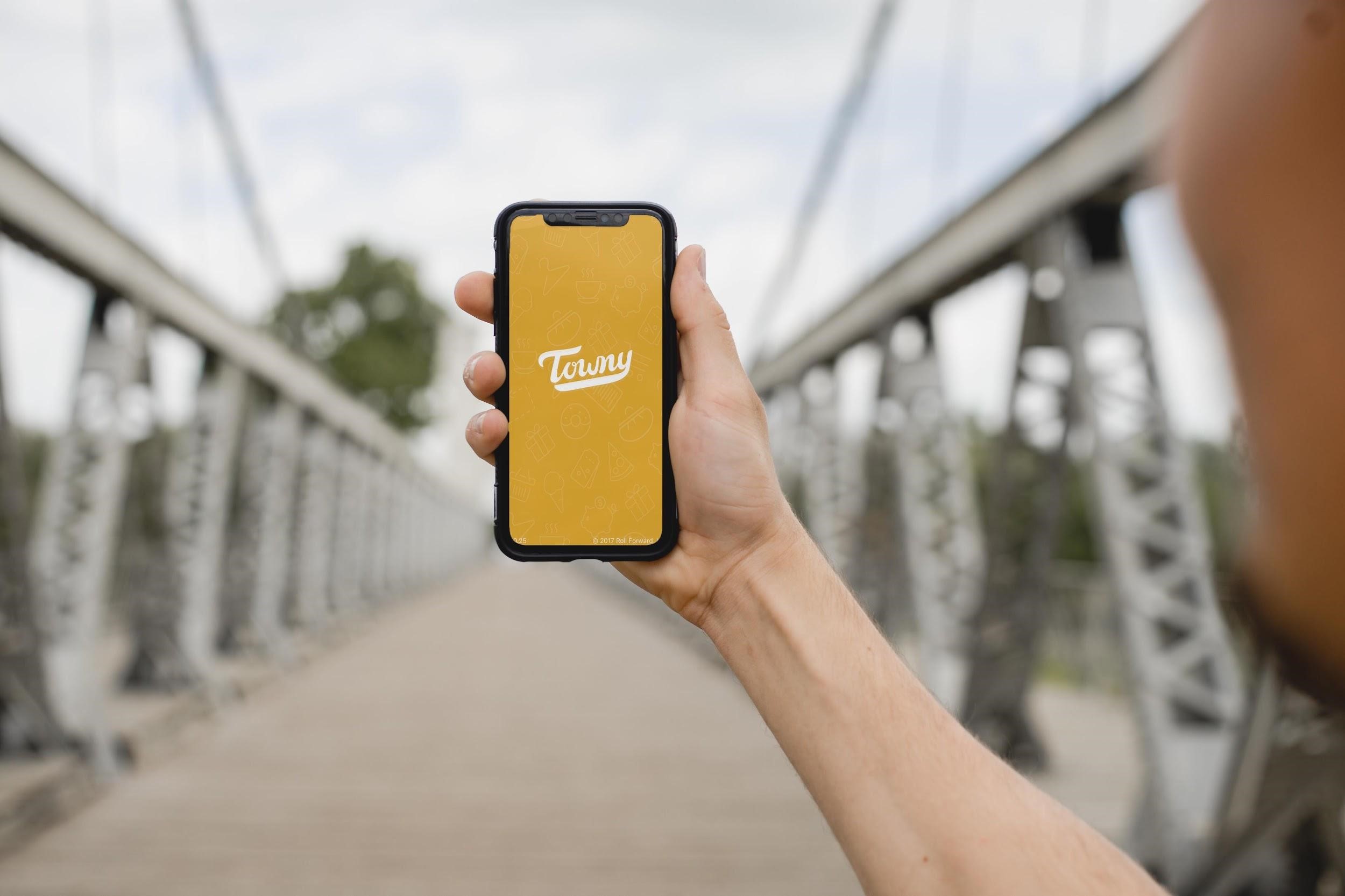 Spending locally matters more than you might think. Local investment, as you Act Locally readers probably already know, helps to create jobs, support vital community services, and strengthen economies. So, high-five! When you spend your hard-earned dollars at Cheddar Box or La Fiesta or Katie’s Custard or other locally owned businesses — 50% of your purchase goes right back into the bettering of your city. That feels good, right?
Spending locally matters more than you might think. Local investment, as you Act Locally readers probably already know, helps to create jobs, support vital community services, and strengthen economies. So, high-five! When you spend your hard-earned dollars at Cheddar Box or La Fiesta or Katie’s Custard or other locally owned businesses — 50% of your purchase goes right back into the bettering of your city. That feels good, right?
Didn’t want another day (or another one of your dollars) to go by without you being aware: there’s a free, app that makes it easier than ever to shop local and save money at the same time.
Let me introduce you to Towny. Towny’s a mobile app (it lives in your phone) that helps you discover and support Waco. It lists our city’s local, independently owned businesses and showcases promotions certain businesses have to offer. You just have to download the app, which is free.
(Sidenote: I was shocked when saw what kinds of “deals” we talkin bout. 50% off where I already go for juice?! 10% off entire purchase at a shop I discovered on the app? Yes, please.)
But it’s not just food and boutiques. It’s auto shops, entertainment, and your local holistic health centers. You’re going to see how helpful it is – to Waco and your wallet.
As a native of Waco, I feel privileged to get an inside look at the entrepreneurial development that’s happening all around us. Mortar and hard hats abound! My co-workers and I that live in Waco (Beth Whittington and Jordan and Jessica Chappell), are thrilled at the opportunity we have to INCREASE connection and communication from local business to consumer and vice versa.
Sooo, Big Picture: What Is Towny?
Each local business here has a story and they want locals to find them. Over 90% of us begin any shopping/eating/purchasing relationship on our mobile phones…that can give big chain businesses a big advantage. They can afford to reach us on our phones, through big advertising. But a local business often doesn’t have a web and graphics team or a huge marketing budget, so 90% of locally-owned businesses have nothing optimized for how consumers begin: on your phone.
It’s not that consumers don’t want to know – they just don’t. Most people love the concept of “support local,” but may not know what to do beyond a bumper sticker.
This is important: Towny attempts to tackle that by forming a coalition of locally-owned businesses in a city, who can more effectively afford a mobile and marketing presence by banding together and pooling some resources.
Towny’s a connector. We connect:
- Local businesses to consumers
- Consumers to businesses
- Communities to their own stories
We’re About the People
Our founder and CEO, Don Shafer, identified this problem by working with local communities and their local banks for the past thirty years. It gave him face-to-face encounters with thousands of business owners. Since starting Towny two years ago, we’ve personally spoken with over 3,700 business owners to understand their challenges, needs, and stories.
“Let’s connect consumers in a city with their local business community,” we said, and haven’t looked back.
Don’t Miss a Beat
We are super excited to be partnering with Act Locally Waco. In the coming months we will be working together to help share the stories of some of Waco’s locally owned businesses.
Meanwhile, grab your phone and download the Towny Rewards app before you forget. Yep, search “Towny Rewards” in your app store. It’s worth it! Spread the word to your Waco peeps (forward this! share this! DM this!) so they, too, can understand the importance of shopping local and thank you later for it! Annnd if you’d like to stay connected to us click here. You won’t miss a thing. ‘Til next time!
 Hannah Franzen is a business growth strategist at Towny. As a Waco native, she loves the opportunity of diving deeper into the local business makeup of Waco.
Hannah Franzen is a business growth strategist at Towny. As a Waco native, she loves the opportunity of diving deeper into the local business makeup of Waco.
The Act Locally Waco blog publishes posts with a connection to these aspirations for Waco. If you are interested in writing for the Act Locally Waco Blog, please email [email protected] for more information.
